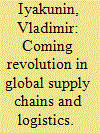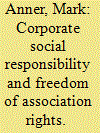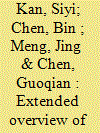|
|
|
Sort Order |
|
|
|
Items / Page
|
|
|
|
|
|
|
| Srl | Item |
| 1 |
ID:
142236


|
|
|
|
|
| Summary/Abstract |
This article critically investigates the growing power and effectiveness of the ‘ethical’ compliance audit regime. Over the last decade, audits have evolved from a tool for companies to track internal organisational performance into a transnational governing mechanism to measure and strengthen corporate accountability globally and shape corporate responsibility norms. Drawing on original interviews, we assess the effectiveness of supply chain benchmarks and audits in promoting environmental and social improvements in global retail supply chains. Two principal arguments emerge from our analysis. First, that audits can be best understood as a productive form of power, which codifies and legitimates retail corporations’ poor social and environmental records, and shapes state approaches to supply chain governance. Second, that growing public and government trust in audit metrics ends up concealing real problems in global supply chains. Retailers are, in fact, auditing only small portions of supply chains, omitting the portions of supply chains where labour and environmental abuse are most likely to take place. Furthermore, the audit regime tends to address labour and environmental issues very unevenly, since ‘people’ are more difficult to classify and verify through numbers than capital and product quality.
|
|
|
|
|
|
|
|
|
|
|
|
|
|
|
|
| 2 |
ID:
107173


|
|
|
| 3 |
ID:
115710


|
|
|
|
|
| Publication |
2012.
|
| Summary/Abstract |
Corporations have increasingly turned to voluntary, multi-stakeholder governance programs to monitor workers' rights and standards in global supply chains. This article argues that the emphasis of these programs varies significantly depending on stakeholder involvement and issue areas under examination. Corporate-influenced programs are more likely to emphasize detection of violations of minimal standards in the areas of wages, hours, and occupational safety and health because focusing on these issues provides corporations with legitimacy and reduces the risks of uncertainty created by activist campaigns. In contrast, these programs are less likely to emphasize workers' rights to form democratic and independent unions, bargain, and strike because these rights are perceived as lessening managerial control without providing firms with significant reputational value. This argument is explored by coding 805 factory audits of the Fair Labor Association between 2002 and 2010, followed by case studies of Russell Athletic in Honduras, Apple in China, and worker rights monitoring in Vietnam.
|
|
|
|
|
|
|
|
|
|
|
|
|
|
|
|
| 4 |
ID:
187470


|
|
|
|
|
| Summary/Abstract |
As the U.S.-China strategic rivalry has intensified, Washington has looked to its close allies and partners to counter Chinese clout in global technology leadership. With the Huawei ban as a proxy for the U.S.-China competition, the paper focuses on the concept of the alliance halo and analyzes how the three key U.S. allies in Asia—Australia, Japan, and South Korea—responded to Washington’s expectations of mutual support on the decoupling of Chinese technology companies from global supply chains. We argue that given that the Huawei ban is about future risks associated with China’s economy, as opposed to demonstrated military threats, it was more challenging to establish allied reliability within the U.S. alliance network as a whole. Our comparative analysis shows that Australia’s reactions have been the most direct, banning Huawei before the United States, showing a contrast with South Korea’s relatively muted responses. Japan’s decision to ban Huawei was as decisive as Australia’s but Tokyo sought to keep a low profile. Rather than the diplomatic pressure from the Trump administration, these allies’ varied responses resulted from their own assessments of security risks associated with Huawei.
|
|
|
|
|
|
|
|
|
|
|
|
|
|
|
|
| 5 |
ID:
171357


|
|
|
|
|
| Summary/Abstract |
As an extension of our previous study on natural gas use in world economy (Kan et al., Energy Policy 124 (2019) 215–225), this paper explores policy implications based on a time series analysis uncovering the evolution of natural gas use embodied in global supply chains during 2000-2011. Due to increasing gas supply from gas-rich regions to gas-scarce regions and outsourcing of energy-intensive industries, trade imbalance of embodied natural gas is intensifying globally, corresponding to strengthening gas resource relocation and environmental stress shift. Regarding trade patterns, EU and Russia remain the leading (net) importer and exporter of embodied gas, respectively. And global trade relations are diversifying over time, with more suppliers and recipients joining the international trade. Based on the New Policies Scenario provided by IEA, a long term forecast of embodied gas use illustrates need to prepare for a world with changing energy mix, with respect to growing availability of low-cost natural gas and robust demand growth coming from emerging economies, especially China, who is struggling to fight against air pollution through coal-to-gas switch. Potential room to expand natural gas utilization is also targeted, and the expansion requires coordination of all the agents in global supply chains.
|
|
|
|
|
|
|
|
|
|
|
|
|
|
|
|
| 6 |
ID:
137599


|
|
|
|
|
| Summary/Abstract |
China's surplus in processing trade remains large. Processed exports are final goods produced using parts and components that are imported duty free. Because much of the value-added of these exports comes from East Asia, exchange rates throughout the region should affect their foreign currency prices. This paper presents data on value-added exchange rates for processed exports over the 1993–2013 period and reports that they significantly affect exports. While the renminbi appreciated 36 percent between the beginning of 2005 and the end of 2013, exchange rates in supply chain countries depreciated. This has mitigated the effect of the RMB appreciation on the price competitiveness of processed exports.
|
|
|
|
|
|
|
|
|
|
|
|
|
|
|
|
| 7 |
ID:
176584


|
|
|
|
|
| Summary/Abstract |
The decoupling policies enforced by the Trump Administration aim to break the US economic relationship with China. Those policies, however, are escalating strategic costs for the US in at least three unanticipated ways: the decoupling policies are losing the endorsement of US multinational corporations, undermining the solidarity of the US and its allies, and making supply chains more likely to disengage from the US than to disengage from China. We argue that the ongoing decoupling policies are costing more than the US can bear and will end in vain. If the Trump Administration enforces further decoupling policies without considering those implicit costs, it will only set the US up for a more expensive failure.
|
|
|
|
|
|
|
|
|
|
|
|
|
|
|
|
|
|
|
|
|